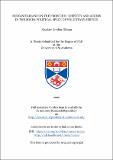Files in this item
Humanitarians on the frontier : identity and access in the socio-political space of voluntary service
Item metadata
| dc.contributor.advisor | Murer, Jeffrey Stevenson | |
| dc.contributor.advisor | Burt, Eleanor | |
| dc.contributor.author | Gordon-Gibson, Alasdair | |
| dc.coverage.spatial | 287 p. | en_US |
| dc.date.accessioned | 2020-02-25T15:34:36Z | |
| dc.date.available | 2020-02-25T15:34:36Z | |
| dc.date.issued | 2020-06-23 | |
| dc.identifier.uri | https://hdl.handle.net/10023/19529 | |
| dc.description.abstract | Failures of international humanitarian response to crisis are a prominent feature of contemporary debate, with most analysis focusing on the application of the core humanitarian principles of neutrality, impartiality and independence, and the diminishing space in which these principles are able to function. This thesis argues that the space for humanitarian action has not diminished but a changed socio-political environment has meant that access to trusted representation in a space for discourse has altered. As an agent for re-direction the study examines whether the phenomenon of ‘voluntary service’ provides a more shared, less contested and more universally accepted identity for expression of the humanitarian purpose and its practices than the current discourse achieves. Through comparative analysis of humanitarian expressions across differing contexts of emergency response and drawing on research from relief agency archives as well as from personal experiences in these environments of complex emergency, the study explores opportunities that arise from understandings of a more dynamic space to house the humanitarian identities. It argues that by recognising and accepting its social and its political identity, humanitarian response can be auxiliary to authority in times of crisis as well as a place for constructive challenge. It is from within the interactions of this socio-political space and its iterations of communal needs that voluntary service draws its identity and its strength. The thesis focuses on considerations of how notions of ‘trust’ frame this community, and how variant understandings of good faith and intent influence the construction of a legitimate, protected space for independent voluntary action in complex emergencies. By considering the nature of the humanitarian relationship on the frontiers of politics and power, opportunities are located for a place in which a more inclusive, less contested discourse on the humanitarian identity might emerge. | en_US |
| dc.language.iso | en | en_US |
| dc.publisher | University of St Andrews | |
| dc.subject | Red Cross principles | en_US |
| dc.subject | Crisis cooperation | en_US |
| dc.subject | Shared discourse | en_US |
| dc.subject | Organisational trust | en_US |
| dc.subject | Institutional efficiency | en_US |
| dc.subject.lcc | HV553.G77H8G20 | |
| dc.subject.lcsh | Humanitarianism | en |
| dc.subject.lcsh | Humaniitarian assistance | en |
| dc.subject.lcsh | International relief | en |
| dc.subject.lcsh | Red Cross and Red Crescent | en |
| dc.subject.lcsh | Disaster relief--Political aspects | en |
| dc.title | Humanitarians on the frontier : identity and access in the socio-political space of voluntary service | en_US |
| dc.type | Thesis | en_US |
| dc.type.qualificationlevel | Doctoral | en_US |
| dc.type.qualificationname | PhD Doctor of Philosophy | en_US |
| dc.publisher.institution | The University of St Andrews | en_US |
| dc.publisher.department | School of Management | en_US |
| dc.rights.embargoreason | Embargo period has ended, thesis made available in accordance with University regulations. | en |
| dc.identifier.doi | https://doi.org/10.17630/10023-19529 |
This item appears in the following Collection(s)
Items in the St Andrews Research Repository are protected by copyright, with all rights reserved, unless otherwise indicated.

